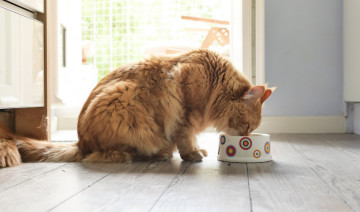
Any pregnant pet needs a special diet to be sure both the mother and her developing offspring receive adequate nutrition to stay healthy during the pregnancy. If your cat is expecting kittens, what dietary considerations do you need for a healthy mama and litter?
About Feline Pregnancies
Female cats are sexually mature enough by 4-6 months old to become pregnant, and because cats have no change in fertile status as they age – no cat equivalent of menopause – they may bear kittens all their lives. Older cats have more dangerous pregnancies with greater risks to both the mother and the developing kittens, and cats having their first litter are likewise susceptible to more complications.
A cat’s gestation period varies from 58-72 days, depending on the cat’s breed, age, health, stress levels, the size of the litter, and prior pregnancies. It can be difficult to determine the exact due date for a cat, however, because the initial symptoms of pregnancy are very faint and may not be noticed right away.
Cats generally have 3-5 kittens per litter, though litter sizes from 1-12 or even more can occur. Larger litters are more common with pedigree cat breeds such as Siamese, Burmese, and Oriental cats, while Persian breeds tend to have smaller litters.
Why a Healthy Diet Matters
A nutritious, healthy diet is essential for a pregnant cat. A good diet will support the mother’s health as well as the health and development of the unborn kittens. Malnutrition, on the other hand, can lead to stillbirth, low birth weight for the kittens, developmental problems, low milk production, and other difficulties. A malnourished mother cat can suffer more complications during labor and delivery, and will not be as prepared to care for any kittens that survive.
Best Food for a Pregnant Cat
As soon as a cat’s pregnancy is noticed or a cat owner plans to breed their pet, it is crucial to switch to healthy pregnancy diet. Foods formulated for kittens or growth and development formulas are best, and will provide better overall nutrition for the pregnant cat. A good cat food for a pregnant cat will include…
- Added protein to support the kittens’ growth and development
- Added calcium and phosphorus for healthy bones and milk production
- Added fat content to provide increased energy for the mother cat
- Fewer carbs so less food is passed as indigestible waste
- High digestibility so the mother cat gets more nutrition from less food
Wet food is often preferred over dry food to feed a pregnant cat, as not only will it be easier to digest and is likely to have a healthier nutritional content, but the added moisture will also help the cat stay hydrated. Ideally, the food should list real meat as the first ingredient, and there should be no fillers in the overall composition of the food.
Feeding a Pregnant Cat
If a cat’s diet needs to be changed to accommodate the nutritional needs of her pregnancy, it is best to slowly change her food over 7-10 days. This will minimize any digestive upset and additional stress, helping the cat adapt to the new taste or texture of the food more readily.
Ideally, a cat should be fed small meals more frequently during her pregnancy. This is especially important later in the pregnancy, when the growing kittens take up more space in the cat’s abdomen, leaving less space for larger meals that will be more difficult to digest quickly. If the cat has trouble eating, leaving more food available can permit the cat to “snack” as needed, but the overall food intake should still be monitored closely.
Unless a veterinarian recommends it, it is not necessary to add vitamin or mineral supplements to a pregnant cat’s diet. The enhanced kitten formula food will be adequate for the mother’s nutritional needs, and extra supplements could cause pregnancy complications. Calcium supplements, for example, can lead to eclampsia after the kittens are born, which can dramatically affect the mother cat’s behavior and how well she is able to care for her litter. If a cat does have known dietary trouble or special nutritional needs before the pregnancy, however, it is best to consult a veterinarian to determine if supplements or other special foods may be necessary.
Avoiding Overfeeding
Though it may seem that a pregnant cat should be able to eat as much as she can, it is important to avoid overfeeding during pregnancy. An overweight cat is more likely to have pregnancy complications and greater birth risks for the kittens, as well as lowered milk production and the potential for later health problems for the mother cat, especially if the weight is not lost after the pregnancy. Weighing the cat weekly during the pregnancy can not only track that her weight is appropriate, but can also help gauge the development of the kittens.
A healthy diet during pregnancy is essential for both the mother cat and her unborn kittens. Understanding a cat’s nutritional needs and diet considerations while pregnant can help any cat owner ensure their cat is a healthy, well-fed mama-to-be.







Comments